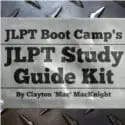The So-Matome N1 Listening book has been giving me a bit of beating. I guess I deserve it to be honest, I would like to take my listening to the next level and be able to at least have a decent understanding of TV shows. But, ouch, what a beating. I’m going to be reviewing on an extremely regular basis.
My progress through StickyStudy has been moving right along as well. One thing that has been annoying me about this particular app though is that they use the kanji for the prompt of the flashcard whether or not that kanji is often used or not. There have been plenty of times when I’ve had to spend a little time trying to remember a kanji that I know is not on the test and not regularly used. I don’t think this is a problem for the lower level decks, but N1 has some issues.
Luckily you can edit the decks pretty easily if this gets on your nerves. I’m personally a little intrigued by the challenge of learning the rare kanji so I’m keeping them in for now. We’ll see how far that goes come test time.
Another thing I’ve started is to really heap on the kanji. I throw in kanji practice now whenever I have a free moment. I’m only about 700 kanji into the 1800 or so that are in N1 and N2 (I’m reviewing a little bit). I’d like to get close to knowing around 75% come test time.
Are Women better at Learning Languages than Men?
Being an English teacher in Japan, I’ve always had this itching question that I can’t seem to answer. It is an observation that I’ve slowly pieced together over the last couple of years of language teaching. And that is,
Are women better language learners?
As evidence of this, most (95%) of my language-teaching Japanese co-workers are women. All of them are generally pretty good communicators.
Most of the students that excel in class and have obtained a higher level of fluency are women.
Most of the students that score higher on the TOEIC (a standardized test of English) are women.
And I’ve been told by a lot of women that majored in English that the men at their college were few and far between.
But, those are just my general, non-empirical, unscientific observations that can’t really be used to prove anything. They are just my mindless meanderings about the subject.
So, is there any Real Proof?
Well, not really.
Although this seems like the kind of thing that would be heavily researched, it really isn’t that much. Scientists generally agree that women are better communicators, but they haven’t really been able to pinpoint why that is. Language is after all a very difficult subject to do research for because there are such a vast number of factors that could affect it.
However, there was one major study that was done with some boys and girls in elementary school. By monitoring which parts of the brain lit up while learning language scientists could get a picture of how girls and boys learn language.
They discovered that girls learn a language in a more abstract way. They don’t necessarily need to see a word written down and spoken aloud to grasp its meaning. Boys on the other hand were more visual and auditory learners using those parts of the brain to learn a language. Furthermore, the centers of the brain responsible for spelling and grammar were more active in girls than boys.
It should be noted that the study was generally considered inconclusive because we don’t know if this difference was due to the fact that girls mature faster than boys or not. So, we can’t be entirely sure if this information holds true for adults or not.
Also, some people say that this learning difference could be caused by nurture and not nature. For example, since girls tend to play with dolls more they might be better communicators.
Observations of Learning Styles
I talked to a few teachers about this subject before and one thing that they tend to point out is that the way men and women behave in class also factors into how well they learn.
Generally speaking, (and you should never make generalizations) men are more aggressive, less afraid of making mistakes when in class. This helps them to talk more and learn more from their mistakes.
Whereas (again generally speaking) women tend to be more observant, more afraid to make mistakes and more self-conscious. This can hurt their ability to improve quickly.
I could see this actually when I taught native Spanish-speakers (before coming to Japan). The higher level speakers were more men because they tended to be less afraid of making mistakes. Whereas women were slightly less fluent. But, that was just my two classes (of 15 or so) that I taught.
Can we make any Conclusions?
There have been no published studies about the gender differences of adults that 100% show a difference that can’t be attributed to something else, so we can’t really know for sure who are the better speakers and what weaknesses a certain gender might have.
But, what do you think? Are women better communicators? Are men doomed to non-communication?
Podcast: Play in new window | Download (Duration: 19:36 — 17.9MB)
Subscribe: RSS













Psst. It’s “Women” in the title too
Thanks for the catch. That was a real bonehead mistake.